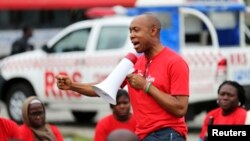The commission-appointed panel, headed by a former Supreme Court justice and including a former major general, is investigating two Reuters articles published last year.
The news agency reported on Dec. 7 that the army has run a secret-pr0gram of coerced abortions in the country’s northeast, where it has been battling Islamist insurgents since 2009. The program has ended the pregnancies of at least 10,000 women and girls freed from insurgent captivity, according to witness accounts and documents.
On Dec. 12, again citing dozens of witnesses, Reuters reported that the army intentionally killed children in the war, under a presumption they were, or would become, terrorists.
Nigerian military leaders said the abortion program did not exist and that children were never targeted for killing.
The state-funded NHRC says it does its best to press officials to act in the interest of citizens whose rights have been violated, eight sources with knowledge of the commission said.
But observers said the NHRC, whose inquiry was supported by the government amid an international outcry, is hobbled by a lack of authority to compel military leaders and other officials to prosecute or punish anyone.
None of these people, including rights lawyers and researchers, was aware of any major cases handled by the commission that had led to the prosecution of senior Nigerian officials – a lack of accountability underscored in United Nations and U.S State Department reports. The commission has secured financial restitution for some victims of abuse.
“Nigeria does not have a decent track record at holding its own accountable,” said Ikemesit Effiong, head of research at Lagos-based consultancy SBM Intelligence, who has followed the commission’s work. “That is even more stark if the stakeholders are military.”
Despite the “brave, serious” people on the commission, a government referral to the NHRC translates to “let’s bury the matter,” said human rights lawyer Nelson Olanipekun, founder of Gavel, a nonprofit promoting justice.
Commission Executive Secretary Tony Ojukwu, a veteran human rights lawyer and activist, declined to comment for this story, apart from urging Reuters in WhatsApp messages to “exercise caution” so as not to prejudice people against the NHRC. It would be improper, he said, for him to engage with Reuters because the news agency could be summoned as a witness in the investigation.
A Reuters spokeswoman said the news agency stands by its reports on military abuses, adding: “We are committed to covering events in Nigeria in an impartial and independent way, as we do around the world.”
Spokespersons for Nigerian President Muhammadu Buhari, the attorney general and the military did not respond to requests for comment about the NHRC probe and rights abuses.





